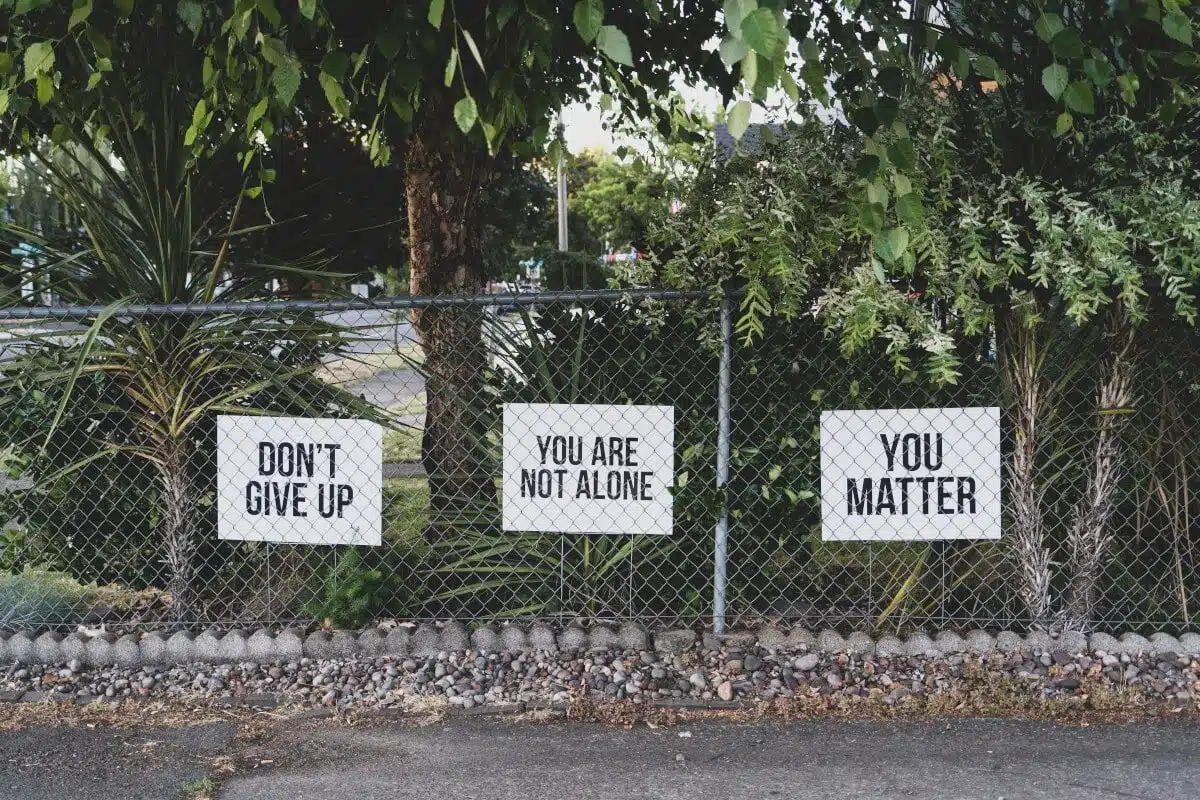
Wondering how to encourage someone? I hope these tips helps!
Before blogging, I spent years working in different mental health settings.
I remain super grateful for everything I learned during that time, including one particular skill:
Knowing how to encourage someone in a time of need.
It was invaluable then and has been ever since! Unfortunately, encouraging someone is harder than it sounds.
There’s an art to doing it well – without patronizing them, projecting your inner “stuff” onto the situation, or even upsetting them by mistake.
If you’re trying to improve at encouraging others, check out these 10 top tips and ideas for doing it more effectively.
[Last updated: June 2023]
Here we go then: my top tips on how to encourage people!
Wondering how to encourage others? You might also like these:
- Key Insights on Loyalty in a Friendship
- 100 Ideas for Making Life Easier
- 101 Ways to Say Good Luck On Your New Journey
- 100 Quotes on Believing in Yourself
- 15 Short Inspirational Stories
- 10 Tips on Growing Through What You Go Through
- 150 Encouraging Words for Friends
- 100 Great Quotes About Missing Friends
- 100 Quotes About Smiling Through Pain
- 100 Unforgettable Quotes about Happy Vibes
- 175 Funny Questions to Ask to Start a Conversation
How to Encourage Someone: 10 Top Tips
Knowing how to encourage someone to do something and/or feeling better about themselves or the world at large can be a challenge.
Here are 10 top tips that should make it easier.
1. Start with Yourself
It seems counterintuitive, but before you can help others you often have to be selfish.
Not selfless.
Selfish.
During a plane crash, you put on your own oxygen mask first, right?
By taking care of yourself before others, you end up in a better position to help.
It’s a similar story with encouraging people.
Taking the time to listen (more on this next), relate, and find soothing or uplifting words of encouragement takes energy!
It’s draining. Sometimes it’s emotional.
So make sure you’re in a good place. Look after yourself. Prioritize your wellbeing. Don’t be too hard on yourself or neglect your own needs for the sake of others.
This isn’t to say that two discouraged people can’t encourage one another.
But you’ll certainly find it easier to “do the encouraging” if you’re in a strong, stable, healthy, and happy place from the outset.
2. Learn to Listen
The purpose of encouragement is to motivate someone, convince them of their capabilities, or to lift their spirits.
And the foundation of success?
Listening.
After all, to know how to encourage someone you first have to understand the problem. And to understand the problem you have to empathise.
And to empathise you have to listen.
So give them your full attention as they explain what’s up. Don’t interrupt; leverage silence. Make eye contact. Watch their body language. Nod your head.
Reflect the last few words of their sentence (e.g. If they say, “I feel as if I’m just not good enough”, you say, “Not good enough”) and let it hang there to compel them to explain further. Ask questions. Be curious.
Do all that and you’ll accomplish two things. You’ll:
i) Make them feel heard and
ii) Get to the bottom of the problem.
Trust me, the very fact you’ve stopped and listened could be all the encouragement they need! In a noisy world, it feels awesome to feel heard.
Learning to listen and be fully present with someone are both key aspects of how to be encouraging.
3. Be There Fully
Here’s a quick tip for encouraging others to full effect:
Stop what you’re doing!
Turn off the TV. Stop scrolling. Hit pause on the YouTube video.
Be present. Give them your full and undivided attention.
They’ll appreciate it. You’ll learn more. And you’ll end up with a much better idea of what you can say or do to help.
4. Be Self-Aware
Last year I met up with my best friend and his girlfriend.
It was a sunny summer’s day, so we went for a walk in the countryside and ended up in a lovely pub garden, where we had a beer or two and started talking about life.
The conversation got onto some of my favourite topics:
Things like motivation, lifestyle design, and making the most of your time.
I remember talking about this stuff, advocating for a focus on time over money, and encouraging them to take a risk, do what makes them happy, and forget about keeping up with the Jones’.
…But the combination of booze, sunshine, and enthusiasm had gone to my head.
And it all became a bit preachy and borderline self-righteous.
Looking back, it got to a point where it was as much about me satisfying some egotistical need to impress them as it was to encourage them.
The lesson?
Don’t be like me in that pub garden!
The whole point of encouraging someone is to focus on them.
Leave your own needs, opinions, and ideals at home if they’re neither helpful nor necessary. Your capacity to encourage others will improve exponentially if you know yourself, keep yourself in check, never project, and leave your ego out of it.
When it comes to encouraging someone to do something, it’s always worth considering if encouragement’s really what they want!
5. Ask Yourself if They Really Want Encouragement
Remember that scene in the Notebook where Ryan Gosling’s asking Rachel McAdams what she really wants?
They’re outside her car and he’s like:
“What do you want? What. Do. You. Want?”
And she’s like:
“It’s not that simple!”
The same situation can apply to people who seem to want encouragement.
They might not.
And anything you say to encourage them will fall on deaf ears.
All they might really want to do is moan, vent, feel validated, and/or get something off their chest.
Those things are fine! But they don’t require the same level of input from any “would-be encourager.”
Listen to them and make your assessment.
Do they really want encouragement from you?
You could even ask them straight up (with compassion and sincerity):
- “What do you need from me right now?”
- “Who can I be for you at this moment?”
- “How can I help?”
If they “only” need a sympathetic ear, the best thing could be to validate their feelings. Say things like “that sounds really tough,” “I don’t know how you put up with that,” or “I’m really sorry you’ve had such a bad day.”
6. Avoid Clichés and Platitudes (Be Authentic)
There’s a time and a place for clichés.
…And encouraging people isn’t one of them.
Imagine feeling forlorn about a dream that seems out of reach, and your friend says something like, “don’t worry, where there’s a will, there’s a way!”
You might appreciate them trying.
But you’re unlikely to feel any better. The comment’s too dull, unoriginal, and inauthentic to truly help.
That’s why I encourage you, the encourager, to do the opposite.
Always be yourself in these situations.
Strive for authenticity, openness, and honesty in your bid to offer encouragement.
And if you can’t think of anything to say? That’s okay.
Don’t be afraid to acknowledge it, either.
Say something like:
“I don’t even know what to say right now. I’m so sorry you feel that way. I wish I could do something to make it better.”
You’d be surprised how comforting a response like that can be.
It works because it’s genuine. You aren’t hiding behind a platitude; you’re being real, and the other person’s sure to appreciate it.
Encouraging people with words is awesome, but there are other ways to do it too!
7. Don’t Limit Yourself to Words
Words of encouragement are great.
They’re often a go-to source of support.
Yet they’re definitely not the only weapon in your arsenal!
Indeed, as we’ve seen, listening in silence can be one of the best ways to encourage others. Physical touch (e.g. hugs, arms over shoulders, and hands on arms) is another option. And so are good deeds.
In fact, think about the 5 different love languages:
Acts of service, gifts, quality time, words of affirmation, and physical touch.
I don’t know this for sure, but I’d be willing to bet that people enjoy receiving encouragement in the same manner in which they like showing/receiving love.
Imagine someone who shows/receives love through acts of service but rarely through words.
You can encourage them in conversation all you like.
But you might be better off bringing them a cup of tea, cooking them dinner, or taking time out of your day to be with them.
8. Practice
Don’t beat yourself up if encouraging people doesn’t come naturally.
It’s not easy!
You have to listen, relate, empathize and sacrifice.
None of those things are a walk in the park.
This is a skill.
And, like any skill, learning how to encourage someone takes time.
Practice makes perfect though, so try to offer encouragement of one form or another at every opportunity! With time, effort, and patience, you’ll start feeling far more comfortable in the role of encourager.
Becoming adept at encouraging others takes time, practice, and self-compassion!
9. Don’t Seek Perfection (and Don’t Beat Yourself Up)
I once worked as a “Network Coordinator” at a mental health charity, which ran a bunch of courses to help people with their mental wellbeing.
The collective name for the groups was “The Wellbeing Network”.
My job was to meet with service users, assess their needs, help them access suitable courses in the network, track their progress over time, and signpost them to other services if ours couldn’t help.
Simple enough.
But those client meetings (both in-person and over the phone) were intense.
There were high emotions, suicidality, and safeguarding issues galore.
And, as a coordinator, it was easy to beat yourself up if something didn’t go to plan.
Maybe you didn’t manage someone’s expectations properly. Perhaps you failed to de-escalate an emotional situation. Or maybe you forgot to ask a key question.
Something we’d say to comfort and encourage each other in these moments was:
There’s no such thing as a perfect meeting.
It was a way of saying:
“Don’t worry. It was never going to go to plan because perfect meetings don’t exist.”
This took the pressure off before meetings and calmed us down after them.
And I think it applies when you’re offering encouragement to people!
Don’t put too much pressure on yourself.
You’re never going to say the “perfect words” or get it 100% right. You might say the wrong thing altogether. And that’s okay too.
There’s no such thing as a perfect meeting anyway.
The important thing is to try.
To do your best in the interest of someone else.
10. Be Wary of Offering Advice
I remember a situation that occurred when I was working in a forensic mental hospital in London.
There was a guy there, a lovely guy, who had paranoid schizophrenia.
One day, one of my colleagues told me they’d had a conversation with him.
This service user was understandably upset about his situation, and in an attempt to console him, my colleague encouraged him to ignore his hallucinations. They said that what he was seeing and hearing wasn’t real.
My colleague had the best intentions, but it was potentially hurtful advice.
First off, our role didn’t involve offering advice or therapeutic intervention.
Second, those hallucinations were exceptionally real as far as the service user was concerned.
And, to top it off, my colleague had no background or qualifications in psychology.
Yet there they were, offering advice on a subject they knew nothing about, which invalidated this guy’s deeply distressing experiences.
Offering this sort of unsolicited advice is something we’re all guilty of at times.
It’s easy to do, especially when you want to improve someone’s mood or predicament.
You want to help, so you tell them what they need and what they should do. Unfortunately, this is rarely the best approach.
After all, any advice you give is based on your worldview, your background, and your approach to life.
So you end up projecting yourself onto their situation.
Instead, be self-aware; know the limits of your knowledge, and recognize that (unless they genuinely ask for it, actively want it, and you’re in a position to give it) encouraging others doesn’t have to involve giving advice.
Remember This Guide to Encouraging People
There you have it then: my 10 top tips on how to encourage someone.
I think it’s fair to say that encouraging people is far easier said than done.
You want to make your loved ones feel better and/or believe in themselves as much as you do. That’s some serious pressure.
With any luck, though, the tips in this post have clarified how to do it and will help you encourage people to greater effect in the future as a result!
Last thing…
There can be real power in a few well-chosen words. In your bid to support others, why not consider giving them some reassuring or inspiring quotes (like these ones)?




